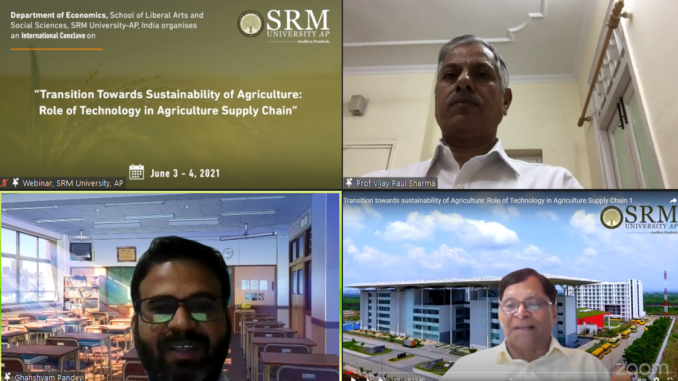
Department of Economics, SRM University-AP organized the International Conclave on “Transition towards sustainability of Agriculture: Role of Technology in Agriculture Supply Chain” on June 3-4th, 2021. Prof Vijay Paul Sharma, Chairman, Commission for Agriculture Costs and Price (CACP), Ministry of Agriculture & Farmer Welfare, GoI, India, was the chief guest of the event. The tope agricultural economist from India and abroad from the reputed institutions, i.e., Arizona State University, USA; Bangabandhu Sheikh Mujibur Rahman Agricultural University, Bangladesh; ICAR-NIAP; IFPRI South Asia Office Delhi; JNU, IIMA, IIMB, IGIDR Mumbai, Delhi School of Economics; Institute of Economic Growth; Symbiosis School of Economics, Pune; Central University of Punjab; Central University of Jammu; Sharda University, Noida; Amity University, Noida; PAU, Ludhiana; AN Sinha Institute of Social Sciences, Patna; Centre for Development Studies; Thrivanthapuram delivered lectures and participated in Panel Discussions in the two-day event.
The event started with the welcome address of Dr Ghanshyam Pandey, Assistant Professor and Head of the Department of Economics, and the opening remarks were delivered by Prof V S Rao, Vice-Chancellor, SRM University-AP.
“The agriculture and food sector are facing multiple challenges. With the global population projected to grow from 7.6 billion in 2018 to over 9.6 billion in 2050, there will be a significant increase in the demand for food. At the same time, the availability of natural resources such as fresh water and productive arable land is becoming increasingly constrained. Production is not the only concern; although agricultural output is currently enough to feed the world, 821 million people still suffer from hunger. Processes such as the rapid rate of urbanization also have important implications for food production patterns and consumption patterns. This will require an urgent transformation of the current agri-food system. Digital innovations and technologies may be part of the solution. In the agriculture and food sector, the spread of mobile technologies, remote-sensing services, and distributed computing are already improving smallholders’ access to information, inputs, market, finance, and training. Digital technologies are creating new opportunities to integrate smallholders into a digitally-driven agri-food system,” said Prof Rao.
In the first Keynote speech of the conclave Prof Vijay Paul Sharma, Chairman, Commission for Agriculture Costs and Price (CACP), Ministry of Agriculture & Farmer Welfare, GoI, India, explained all the aspects of the agriculture sector to achieve sustainable growth. He started with agriculture production shifted from supply-driven to demand-driven, filling the yield gap between the states and moved on to the right kind of government intervention to improve the farmers’ welfare, shortage of labourer and mechanization, technology, credit infrastructure, public investment, and climate change and variability.
Prof R S Desh Pande, a renowned economist, pointed out that we are at a stagnant point in agriculture, and the sustainability of agriculture would be very challenging. He mentioned that commercialization (cropping method) and greed are the two major enemies of sustainability. He mentioned that largely we are getting the technology which is cost increasing techniques rather than cost-saving which ultimately leads to the decline of the net income of the farmers from the last two decades.
Advancing into the event, Prof P S Birthal, National Professor, ICAR-NIAP, PUSA Delhi, India, illuminated the audience with his strategic discussion on Agricultural Technologies and Supply Chains for Sustainable Agricultural Development. He discussed that in all revolutions in agriculture and allied activities in India, a common element had been the technology, although it was driven by different agents. He mentioned that technology is a key source for agricultural growth. Investment in research and development has increased but much less than the several developing and developed countries globally. He also mentioned that growth in agricultural markets had not kept pace with growth in agricultural production. Markets are inefficient because of poor infrastructure and communication networks that result in the higher cost of trade to sellers and buyers, along with asymmetric information between them. He has given some suggestions for farmers to benefit from, i.e., doorstep offtake of the produce, access to improve technology, quality inputs, access to credit insurance against market price, and diversification from water-guzzling crops like rice.
Prof Prem Vashistha from Sharda University highlighted the research innovation done by IFCO for liquid urea. A bottle of 5 ml urea is equally effective to one bag of urea, which is economical and reduces the burden of subsidy from the government. He mentioned this kind of revolution we required in all the areas for sustainable agriculture reducing subsidies. He also gave stress on linkages between institutions with the market are very important.
While talking on the role of technologies for sustainable agriculture, Dr Anjani Kumar, a senior fellow from International Food Policy Research Institute, South Asian Office, Delhi, mentioned how research is essential. Dr Kumar indicated that marginal returns to agricultural R&D expenditure are low for high-income states while more for low-income states. His research shows that R&D significantly impacts reducing poverty and inequality. He also mentioned that the seed replacement rate is frequently high in developed states while very low in underdeveloped states.
Almost 20 distinguished panelists and 20 presenters, along with more than 100 participants, attended the event. Dr Ananda Rao Suvvari, Assistant Professor, Department of Economics, SRM University-AP, cordially thanked all the speakers and panelists for their efforts to make the conclave a grand success.
